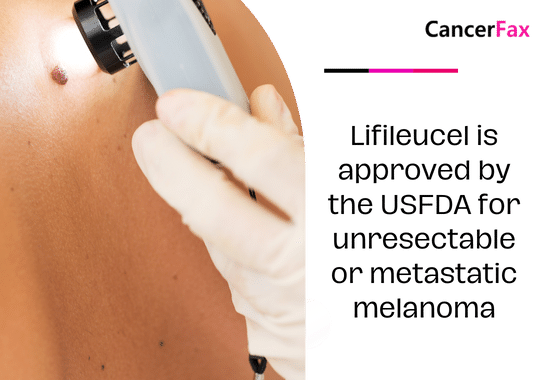Lifileucel is approved by the USFDA for unresectable or metastatic melanoma
The Food and Drug Administration granted accelerated approval to lifileucel (Amtagvi, Iovance Biotherapeutics, Inc.) on February 16, 2024. This approval is for adult patients with unresectable or metastatic melanoma who have been previously treated with a PD-1 blocking antibody. Additionally, patients must be BRAF V600 positive and have received a BRAF inhibitor with or without a MEK inhibitor.
An open-label, single-arm trial was conducted globally across multiple centers and cohorts to assess the safety and effectiveness in patients with unresectable or metastatic melanoma. These patients had received prior treatment with at least one systemic therapy, which included a PD-1 blocking antibody. If they tested positive for the BRAF V600 mutation, they had also been treated with a BRAF inhibitor, with or without a MEK inhibitor. Out of 89 patients who were given lifileucel, two were omitted because the product did not fulfill specifications and five were excluded owing to product comparability. Lifileucel was given after a lymphodepleting treatment regimen which included cyclophosphamide at a dose of 60 mg/kg daily with mesna for 2 days, followed by fludarabine at a dose of 25 mg/m2 daily for 5 days. Patients were administered IL-2 (aldesleukin) at a dosage of 600,000 IU/kg every 8 to 12 hours for up to 6 doses between 3 to 24 hours after infusion to promote cell growth in vivo. The median dose of lifileucel delivered was 21.1× 109 viable cells. The median number of IL-2 (aldesleukin) doses delivered was 6.
The primary efficacy metrics were the objective response rate (ORR) and duration of response (DoR). The median time for the initial reaction to lifileucel was 1.5 months. The ORR study included 73 participants who were administered lifileucel within the prescribed dosage range of 7.5 x109 to 72×109 viable cells. The objective response rate (ORR) was 31.5% with a 95% confidence interval (CI) of 21.1% to 43.4%, and the median duration of response (DoR) was not reached (NR) with a 95% CI of 4.1 months to NR.
The prescribing material includes a Boxed Warning for treatment-related death, sustained severe cytopenia, severe infection, cardiac issues, and renal impairment. The most frequent adverse effects (≥20%) in descending order of occurrence were chills, pyrexia, tiredness, tachycardia, diarrhea, febrile neutropenia, edema, rash, hypotension, alopecia, infection, hypoxia, and dyspnea.
The suggested lifileucel dosage ranges from 7.5 x 10^9 to 72 x 10^9 viable cells.
Dr. Nishant Mittal is a highly accomplished researcher with over 13 years of experience in the fields of cardiovascular biology and cancer research. His career is marked by significant contributions to stem cell biology, developmental biology, and innovative research techniques.
Research Highlights
Dr. Mittal's research has focused on several key areas:
1) Cardiovascular Development and Regeneration: He studied coronary vessel development and regeneration using zebrafish models1.
2) Cancer Biology: At Dartmouth College, he developed zebrafish models for studying tumor heterogeneity and clonal evolution in pancreatic cancer.
3) Developmental Biology: His doctoral work at Keio University involved identifying and characterizing medaka fish mutants with cardiovascular defects.
4) Stem Cell Research: He investigated the effects of folic acid on mouse embryonic stem cells and worked on cryopreservation techniques for hematopoietic stem cells.
Publications and Presentations
Dr. Mittal has authored several peer-reviewed publications in reputable journals such as Scientific Reports, Cardiovascular Research, and Disease Models & Mechanisms1. He has also presented his research at numerous international conferences, including the Stanford-Weill Cornell Cardiovascular Research Symposium and the Weinstein Cardiovascular Development Conference.
In summary, Dr. Nishant Mittal is a dedicated and accomplished researcher with a strong track record in cardiovascular and cancer biology, demonstrating expertise in various model systems and a commitment to advancing scientific knowledge through innovative research approaches.
- Comments Closed
- March 5th, 2024






Advanced melanoma immunotherapy, AMTAGVI therapy, FDA-approved melanoma treatment 2024, First cellular therapy for solid tumors, Iovance Biotherapeutics breakthrough, Lifileucel approval, TIL treatment for melanoma, Tumor-infiltrating lymphocyte therapy
CancerFax is the most trusted online platform dedicated to connecting individuals facing advanced-stage cancer with groundbreaking cell therapies.
Send your medical reports and get a free analysis.
🌟 Join us in the fight against cancer! 🌟
Привет,
CancerFax — это самая надежная онлайн-платформа, призванная предоставить людям, столкнувшимся с раком на поздних стадиях, доступ к революционным клеточным методам лечения.
Отправьте свои медицинские заключения и получите бесплатный анализ.
🌟 Присоединяйтесь к нам в борьбе с раком! 🌟